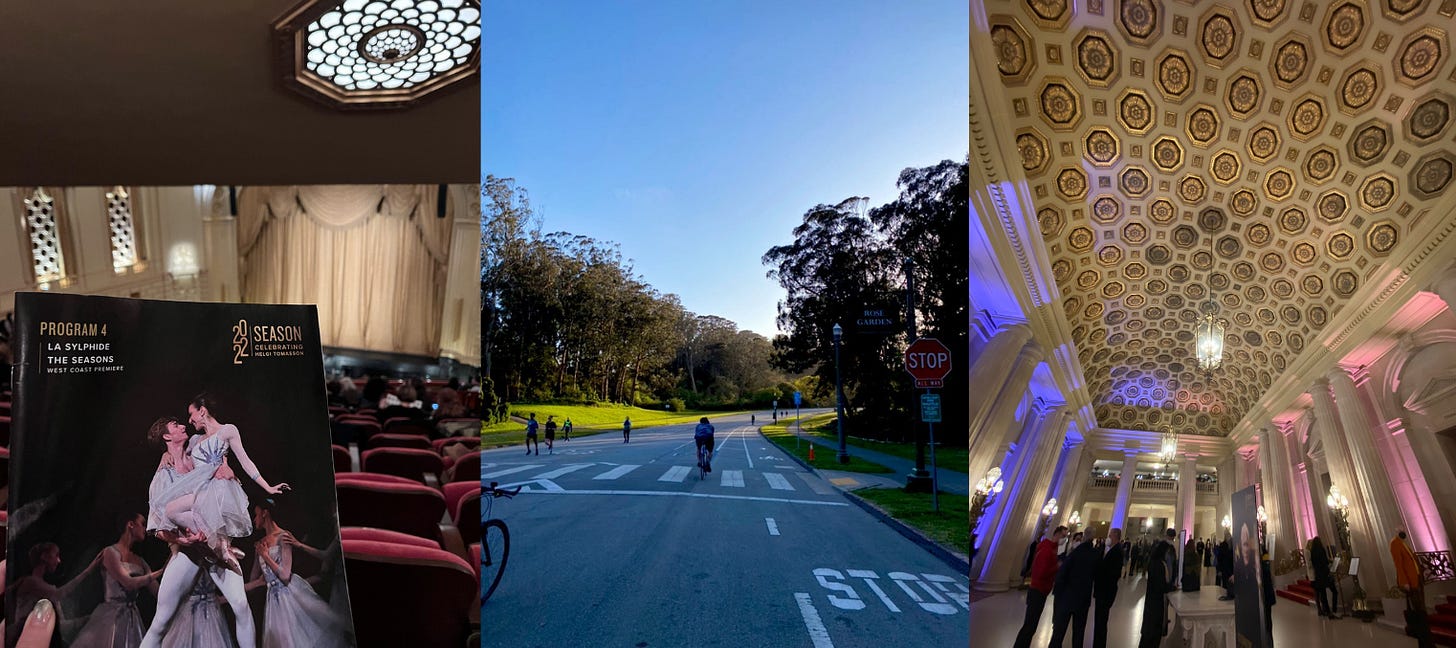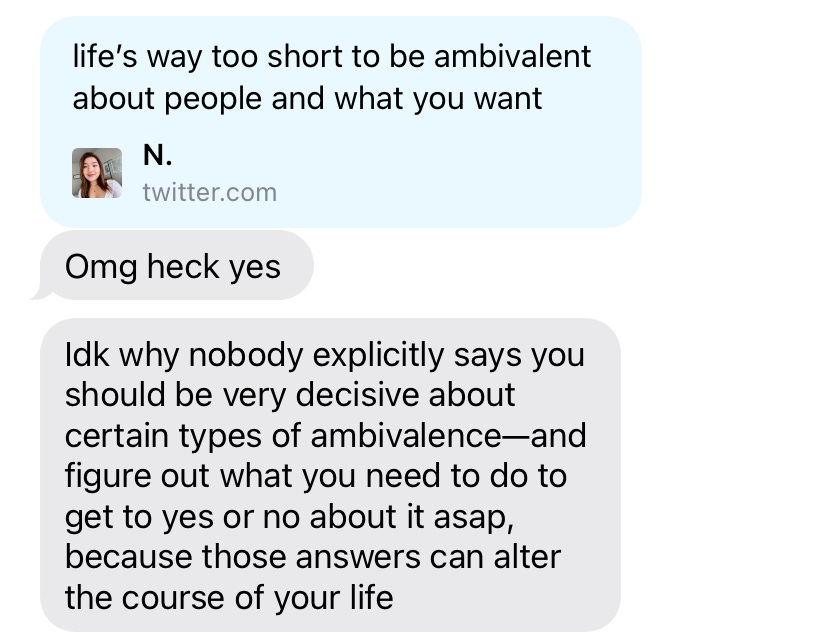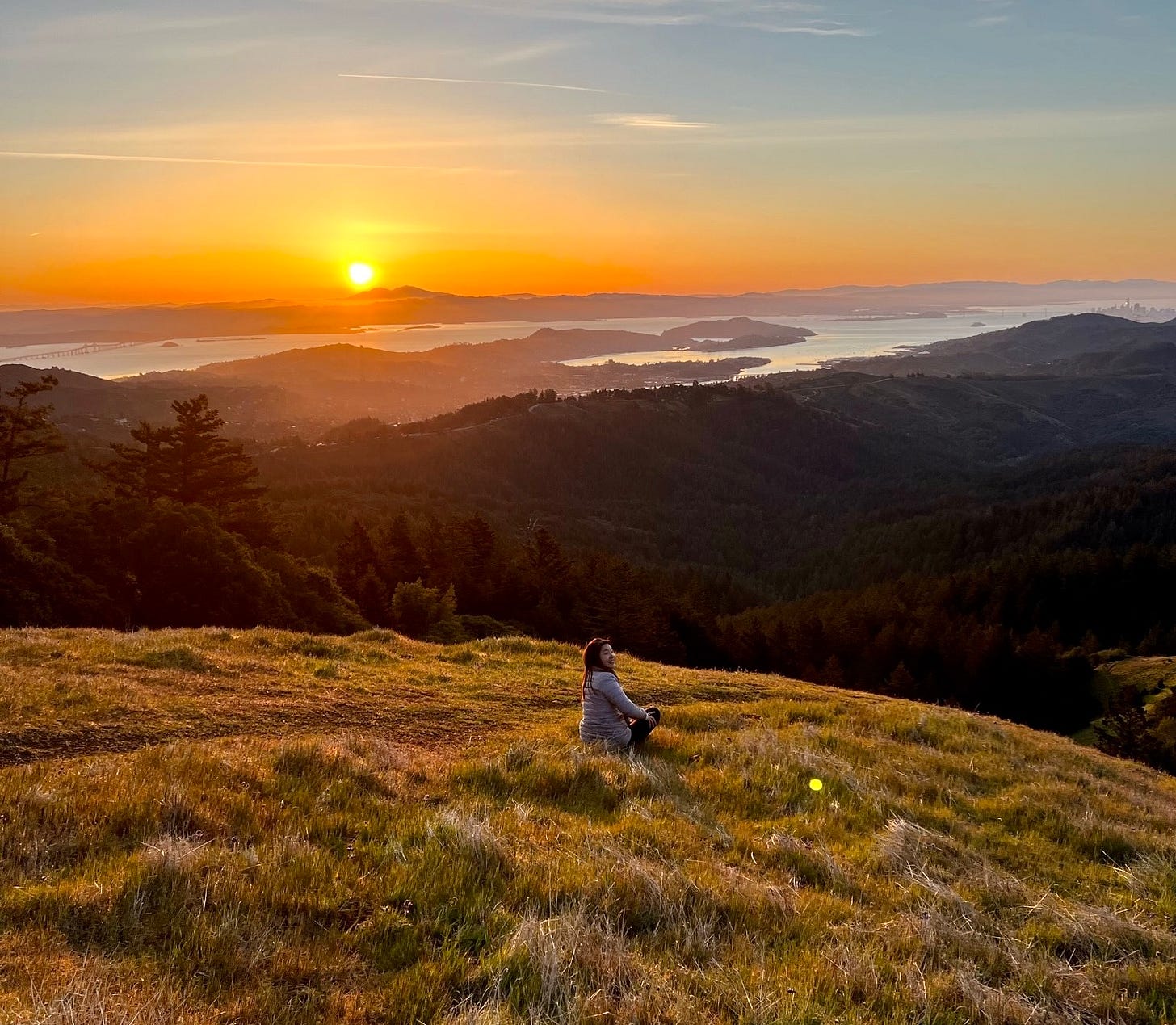lukewarm feelings
how to magnify your spirit
One of the best pieces of advice I’ve ever received from a mentor was to reduce exposure to lukewarm feelings and lean into genuine joy.
What is a lukewarm feeling? I’m sure you know it. It’s the feeling of going to something and feeling tepid about it, dating someone out of boredom rather than genuine interest, feeling kind of meh about an interaction. Unfortunately, a lot of life is lived in a lukewarm range. We do so many things out of obligation instead of joy, pursue acts as means to an end rather than for pleasure in the process, spend time with people to avoid loneliness rather than actually being nourished by their presence. It’s a half-hearted, half-love situationship. There’s no hatred, but there’s also no wonder. There’s no ardor, only apathy. And to me, apathy and indifference are the opposite of love.
My take is that life is way too vivid and brief to be ambivalent about people and things that you want. I have been trying to embody what B tells me all the time: I hate maybe’s in life. It's a hell yes or it’s a no.
To be clear, this is not to say that everything has to be an incredible, extravagant, insane experience. Or that every interaction should leave you feeling mind-blown. It’s not about exhilaration or intensity. Wholehearted living can be taking a walk in a quiet forest, allowing the lush greenness to reflect serenity in your mind. Joy can be spending time alone listening to BANKS on repeat while steaming dumplings for dinner. The real sentiment I’m trying to convey is that the choices we make should engender overall good feelings. It should be a clear yes to you at this specific time in your life. And nobody can define what a hell yes means other than you.
Precisely this: the yes or no feeling can alter the choice of your life.
When I made the realization that I was the guardian of how good I could feel, everything clicked. I realized how often I was holding myself captive in things I didn’t actually want, or feeling embarrassed or silly for liking the things I actually did. I started to avoid things I didn’t enjoy (partying, superficiality, draining mindsets, useless comparisons) and gave access to things I did (writing – I am writing this substack! deep friendships, reflection, art, solitude). I am so much more content when I’m defining my arc in proportion to what I truly love (obvious advice, but it was hard to enact). My college has a cool tradition of writing a letter to freshmen when you graduate. In mine, I wrote “never dilute the things you love with the expectations for what you should love.” I stand by that more than ever now.
So, I’m directing this beautiful question by Patti Smith to you: What are the ideas that magnify your spirit? What makes you come alive?
Genuine interest and acting on it is so, so sacred. The more repetitions you have of selecting authentic enjoyment over lukewarm-feelings, the more self-trust and self-safety you build. You have a better noise-to-signal ratio. You know what feels good. You don’t dim down and doubt love when you actually feel it. You accept it completely with an open heart. You magnify your spirit.
Doesn’t it feel good being safe in yourself, your animal and cerebral self? The self that is curious and captivated – the wide-eyed inner child that careens toward interest and true warmth. Seeking soul-pleasure sustains your radiance. I’m asking you to lean into it. There’s no room for lukewarm feelings here.
-N.
Quote of the week
Art is prayer. It’s my prayer. And if my prayer becomes prayer for others, then my art becomes intimately others’
(Andrei Tarkovsky)
Thoughts of the week
this is a fun section where I share ideas from people through great conversations or reading their writing pieces online (I want to move into interviews too in upcoming newsletters)
Microsolidarity theory (by microsolidarity.cc, shared via @patriciamou)
Found this nugget of wisdom from Patricia’s fantastic newsletter Rabbitholes, which always gives me inspiration on personal development, philosophy, and other curiosities
Microsolidarity theory outlines that different sizes of groups are good for different things. There are 5 sizes this theory focuses on:
The self-as-a-group
The dyad (2 people)
The crew (about 3-5)
The congregation (about 15-150)
The network of congregations
Key takeaways:
Self: the relationship between the parts of yourself has a parallel to your relationships with other people. If I'm constantly trying to disown, or ignore, or dominate the anxious parts of myself, I’m going to have the same instinct when I see the anxious parts of you.
The Dyad: Domination relationships are the root of all injustice, and partnership relationships are the root of all freedom.
The Crew: if you want to create a livelihood of meaningful work, you’ll need a crew to do it with. This is the center of activity in microsolidarity communities.
The Congregation: The "minimum viable purpose" for a congregation is that it supports crews to form - crews and congregation are in reciprocal co-development.
The Network: growth always happens inside of something else. Your personal development is much more likely to proceed smoothly when you have a crew. It’s easier to find a crew when you’re in a congregation. The congregations are learning from each other in the network. Each step up the ladder of scale creates a developmental container for the previous.
We need to create a “University of Meaning” (from @tomschulz)
Paraphrasing a short conversation that sparked a lot of thought with Tom, the human definition of ‘good energy’
We conform to our supposed roles in society, other people’s ideas of what we should be, conform to all the roles we subsume. Why can’t we conform to figuring ourselves out? Perhaps it is possible to create an actual campus or university of likeminded people with the common goal of finding personal meaning.
The Reconstitution of Soul (from @kev_esh / @vigoda_aleena)
Interested in this idea of the continuity of the soul and the interconnectedness of past experiences/people. Also, they are both great writers - read Seeking Sanctity in Synchrony (A) and Meditation 101 (K)
Aleena: The idea is that our souls decompose the ways branches of a tree would; disintegrating into soil to be reborn in the roots of our next lives. So maybe we don't keep one soul that travels between our ethers in each life; maybe each of our souls become part of others, maybe we all share past lives, past experiences, past realities.
Kevin: Mind and matter are two sides of the same coin, they share properties. Perhaps we can take properties that are well understood about the physical universe and explore how they might bear out in the realm of mind. My idea here was based largely on the concept of the law of conservation of matter applying to "mind" as well. Bodies break down, but the atoms still exist, they're just reconstituted elsewhere. Maybe something of this nature is happening with mind/soul as well, some pieces of an individual remaining together and reconstituting in a new body.
Photos of the week
some lovely ones from this weekend, very grateful










